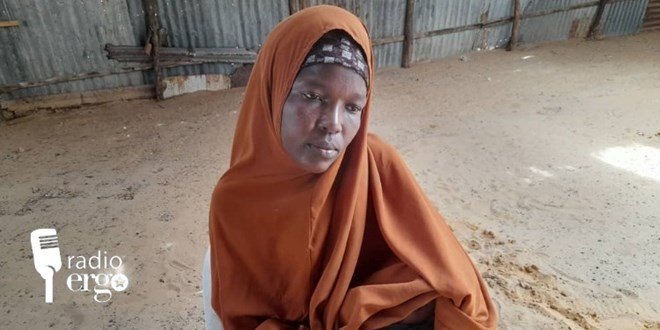Wednesday 15, Jan 2025 {HMC} Hawo Salah Ahmed, a mother of seven, lost her three-year-old son on 12 December 2024 after he suffered from diarrhoea and severe dehydration for over a week at their home in the internal displacement camp where they live in the Somali capital Mogadishu.
Hawo told Radio Ergo that when her son’s condition worsened, she took him to a pharmacy near the camp. After an examination, she was told her son had watery diarrhea and needed to buy medication every two days costing $10 a time.
Hawo could not afford to buy the medication. She attributed her son’s death to the financial hardship facing her family and the conditions in Danyar IDP camp that meant she couldn’t give him with the care he needed.
“My child suffered from watery diarrhoea. I couldn’t afford to take him to the hospital. I was desperate. His condition worsened, but we had no money, no resources, and he passed away because I couldn’t get him the care he needed,” Hawo stated.
Hawo’s family, who are struggling to adapt to life in the camp and the capital city, rely on a single meal a day provided by neighbours. They live in a makeshift shelter made of cloth and sticks that often collapses in the windy weather and is constantly needed to be patched up.
Basic services in the camps are severely lacking. Clean water is scarce, and sanitation facilities are almost non-existent.
“If you’re lucky enough to get a single jerry can of water in a day, you feel fortunate. There are no proper toilets, and we are left to fend for ourselves,” Hawo explained.
The family fled conflict between government forces and Al-Shabaab in Basra, Lower Shabelle region, in June 2024, leaving behind their one-hectare farm where they grew vegetables. Like many displaced families, they face extreme poverty and instability.
According to local NGO, Somali Health Awareness Organisation, 15 children aged between 3 and 10 years have died from watery diarrhoea in the past two months in Horseed and Danyar internal displacement camps, located respectively in Garasbaley and Kahda districts of Mogadishu.
Markab Mohamed Abdi, another resident of Danyar camp, lost her eight-year-old son on 5 December due to an unknown illness that caused severe abdominal swelling. She explained that there is no health facility in the camp to address such emergencies.
“My child wasn’t sick for long; it was a sudden illness. His stomach swelled up, and there was no assistance or medicine here. Children just get worse and die because there’s no care,” she said.
Markab expressed her concern about two of her other children, aged four and five, who are now showing symptoms similar to those that led to the death of her son. She fears for their lives, as she cannot afford medical care.
Markab and her husband, displaced from Basra in mid-2024, have not been able to secure any work to support their family since arriving at the camp. Previously, they were pastoralists who lost 60 livestock killed during airstrikes and conflict.
Horseed and Danyar camps are home to over 900 families displaced by conflict, drought, and floods. Many have lost their livelihoods and homes. With no access to clean water or proper sanitation, these crowded camps are a breeding ground for diseases like watery diarrhoea.
A member of Somali Health Awareness organisation, Dr Abdifatah Omar, visited the camps on 24 December and described the conditions as dire. He reported severe cases of watery diarrhoea, exacerbated by malnutrition.
“When we visited the camps, we saw desperate humanitarian conditions. I personally observed 17 critical cases of watery diarrhoea. The outbreak is spreading at an alarming rate, primarily because of the lack of clean water and basic sanitation,” Dr Abdifatah told Radio Ergo.
The crisis in these two camps highlights the urgent need for humanitarian aid for displaced families facing multiple challenges, including poor health, inadequate shelter, and food insecurity.
SOURCE




